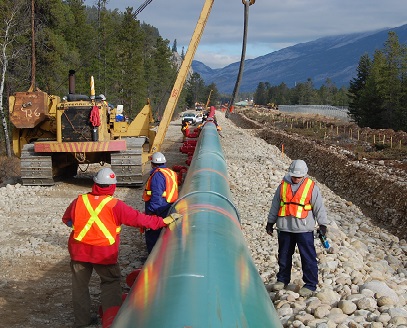Mountain Valley Pipeline's West Virginia Water Permit Tossed by Court
(Reuters) — A federal appeals court on Monday vacated a water permit needed by developers to restart construction on the Mountain Valley pipeline in West Virginia, marking the latest setback for the $6.2 billion project.
The Richmond, Virginia-based 4th U.S. Circuit Court of Appeals found several defects in the review the West Virginia Department of Environmental Protection conducted before issuing the permit.
Construction can't restart in the state until the agency reconsiders the permit, which is needed before the 303-mile proposed pipeline can cross through the state’s streams and wetlands.
RELATED: Mountain Valley Clears Permit Hurdle for 303-Mile Pipeline Project in Virginia
A spokesperson for developer Equitrans Midstream Corp. said the company is reviewing the decision, adding the project has undergone "unprecedented" environmental reviews and is being built to "higher environmental standards than any similar project" in the state.
Landowners and environmental groups including the Sierra Club sued in 2022, asking the 4th Circuit to toss the permit. They told the court the agency ignored Equitrans' history of violating state water regulations when it issued the permit under the Clean Water Act.
A unanimous three-judge panel of the 4th Circuit agreed those violations, which included 139 state stormwater permit violations and dozens of state water quality standards violations, warranted closer scrutiny.
“In the face of such a history, it is arbitrary and capricious for an agency to predict compliance without a rational explanation,” wrote Chief Judge Roger Gregory.
A spokesperson for the West Virginia Department of Environmental Protection said they're reviewing the decision.
The permit is one of the last remaining hurdles for the multibillion-dollar project, which would carry natural gas between West Virginia and Virginia. Equitrans has said the pipeline is 94% complete, though opponents say that figure fails to account for the full scope of work needed to complete the project.
The pipeline has been the subject of numerous lawsuits, including an earlier challenge to a general water construction permit issued by the U.S. Army Corps of Engineers, which the 4th Circuit vacated in 2018.
The bulk of the unfinished portions of the pipeline either cross streams and rivers or go through the Jefferson National Forest in Virginia. The federal government is currently considering whether to reissue a permit for the forest crossing, and the 4th Circuit last month upheld a Virginia water permit needed for stream crossings in the state.
The case is Sierra Club et al. v. West Virginia Department of Environmental Protection et al, 4th U.S. Circuit Court of Appeals, case No. 22-1008.
Related News
Related News

- Keystone Oil Pipeline Resumes Operations After Temporary Shutdown
- Biden Administration Buys Oil for Emergency Reserve Above Target Price
- Freeport LNG Plant Runs Near Zero Consumption for Fifth Day
- Enbridge to Invest $500 Million in Pipeline Assets, Including Expansion of 850-Mile Gray Oak Pipeline
- Williams Delays Louisiana Pipeline Project Amid Dispute with Competitor Energy Transfer
- Evacuation Technologies to Reduce Methane Releases During Pigging
- Editor’s Notebook: Nord Stream’s $20 Billion Question
- Enbridge Receives Approval to Begin Service on Louisiana Venice Gas Pipeline Project
- Mexico Seizes Air Liquide's Hydrogen Plant at Pemex Refinery
- Russian LNG Unfazed By U.S. Sanctions





Comments